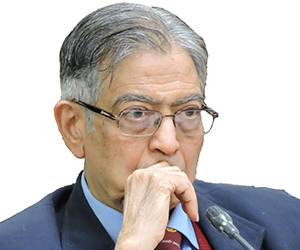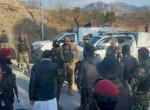The Indian external affairs minister’s visit to Pakistan from September 7-9 epitomised India’s composite re-engagement with Pakistan. It flies in the face of the assurances provided by the prime minister in his address to the Lok Sabha on July 29th that India “can have a meaningful dialogue with Pakistan only if they fulfil their commitment, in letter and spirit, not to allow their territory to be used in any manner for terrorist activities against India.”
Krishna’s visit to Pakistan marks the culmination of two rounds of comprehensive talks between the two countries decided upon during the February 2011 foreign secretary-level talks in Thimphu. During his visit to Islamabad Krishna not only had discussions with his counterpart but also had meetings with the president, the prime minister, the interior minister and with leaders of political parties like the MQM, ANP and the PMLN. The visit was also marked by the signing of a liberalised visa agreement, a cultural agreement and a meeting of the India-Pakistan Joint Commission that was last held in 2007. The joint commission identified areas of cooperation in the fields of agriculture, education, environment, health, information, Information Technology and telecom, science and technology, and tourism. A series of measures were also agreed upon for easing travel and trade across the line of control. It was further decided that the next round of the secretary-level comprehensive dialogue process be launched that will come up for ministerial level review in New Delhi in 2013.
The lengthy 28 paragraph joint statement states that the talks were held in a ‘cordial, candid and constructive atmosphere’ and that there were ‘substantive discussions on the whole range of issues within the framework of the dialogue process’ with the ministers ‘expressing satisfaction over the progress achieved since their last review meeting in July 2011’. While there may have not been forward movement on many important issues like terrorism, Sir Creek and Siachen, the talks were cordial and wide ranging which is inexplicable in the light of the assurances given by PM in the Lok Sabha and given Pakistan’s continued hostility towards India.
Evidence of Pakistan’s inimical attitude towards India after the 26/11 attacks is borne out not only by its failure to make any serious efforts to bring to book the perpetrators but also by continued involvement in terrorist actions against India, like the Pune bombings of February 13, 2010 resulting in 17 deaths, the Mumbai serial blasts of July 13, 2011 resulting in 18 deaths and the Delhi High Court bombings of September 7, 2011 resulting in 11 deaths. Indeed, Abu Jindal’s debriefings confirm that Pakistan continues to plan similar terrorist actions against India. The resumption of cross-LoC firing by Pakistan, which had been stopped by Musharraf, continued terrorist infiltration from across the LoC, the relentless and massive pumping in of fake currency by Pakistan into India, the revival of its support to the Babbar Khalsa, its refusal to hand over to India any of the nearly 50 wanted terrorists, like Dawood Ibrahim, to whom its provides shelter, and its unwillingness to shut down the infrastructure of terror are proof that it means to continue to use terror against India in a ‘business as usual’ mode.
To add insult to injury the Pakistan foreign minister in an interview just before our external affairs minister’s visit urged that India should look at the 26/11 attacks “unemotionally”, drawing a parallel between them and the attacks on the Samjhauta Express and the 1971 conflict. This insensitivity was further reinforced in the joint press conference addressed by the two foreign ministers when she asserted that the two sides “should not be held hostage to history” but should look to the future.
Instead of challenging the Pakistan foreign minister at the joint press conference for the aforesaid comments and underlining the critical importance of addressing our terrorism-related concerns Krishna not only complimented the Pakistani leadership for bringing about “a positive change in the atmosphere” but echoed her thinking by stating “let us not look back, as you have very rightly said; let us not be held hostage to whatever has happened earlier…….Let us look to the future”. It is not surprising, therefore, that the Pakistani media has drawn the conclusion that India no longer attaches the importance it earlier did to bringing to book those involved in the Mumbai attacks.
It is logical to assume that it is only a matter of time before the PM who is “keen” to visit Pakistan will do so. Though prior to his departure in an interview to the Express Tribune the external affairs minister had stated that the “right atmosphere” would have to be created for it and that it should have a “substantive outcome” in Pakistan, in the joint press conference in Islamabad while not indicating any date for the visit he asserted that there was no question of progress on the 26/11 attacks being a condition for PM’s visit to Pakistan. Clearly, the government seems to have given up all pretence of pressurising Pakistan to give up the use of terror as an instrument of foreign policy against us.
PM’s visit to Pakistan irrespective of whether or not Pakistan addresses our concerns on terrorism is supported by some in India on the grounds that it would provide an impetus to the current upturn in ties and would strengthen the hands of the civilian set up in that country. In this context, it may be mentioned that the upturn in ties is an illusion based on sweet nothings mouthed by Pakistan and our failure to retaliate against its many provocations. It tactically suits Pakistan to maintain this illusion as it is isolated and as this illusion deflects the pressure on it to shut down the infrastructure of terror.
Forward movement on trade by Pakistan, which is acclaimed as a sign of its positivity, has been long delayed and tardy and is, primarily, in its own interests. To date it has not accorded us the MFN status, which we did in the mid 1990s. It still maintains a negative list of nearly 1,200 items, allows movement of only about 200 items through land, and does not permit us transit rights for overland exports to Afghanistan. As regards the civilian government in Pakistan, our investing in it is pointless since it does not exercise real power, it will have to demit office latest by March 2013, and, in the ultimate analysis, it is also imbued with an anti-Indian mindset.
Published Date: 12th September 2012










Post new comment